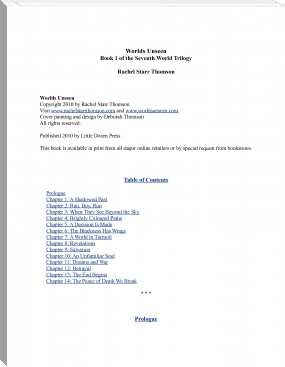The Enchanted Typewriter by John Kendrick Bangs (top 10 non fiction books of all time TXT) 📖

- Author: John Kendrick Bangs
Book online «The Enchanted Typewriter by John Kendrick Bangs (top 10 non fiction books of all time TXT) 📖». Author John Kendrick Bangs
"What an ungrateful machine you are!" I cried. "If you have sense enough to go into writing on your own account, you ought to have mind enough to remember the years you spent up-stairs under the roof neglected, and covered with hammocks, awnings, family portraits, and receipted bills."
"Really, my dear fellow," the machine tapped back, "I must repeat it. Bed is the place for you. You're not coherent. I'm not a machine, and upon my honor, I've never seen your darned old attic."
"Not a machine!" I cried. "Then what in Heaven's name are you?--a sofa-cushion?"
"Don't be sarcastic, my dear fellow," replied the machine. "Of course I'm not a machine; I'm Jim--Jim Boswell."
"What?" I roared. "You? A thing with keys and type and a bell--"
"I haven't got any keys or any type or a bell. What on earth are you talking about?" replied the machine. "What have you been eating?"
"What's that?" I asked, putting my hand on the keys.
"That's keys," was the answer.
"And these, and that?" I added, indicating the type and the bell.
"Type and bell," replied the machine.
"And yet you say you haven't got them," I persisted.
"No, I haven't. The machine has got them, not I," was the response. "I'm not the machine. I'm the man that's using it--Jim--Jim Boswell. What good would a bell do me? I'm not a cow or a bicycle. I'm the editor of the Stygian Gazette, and I've come here to copy off my notes of what I see and hear, and besides all this I do type-writing for various people in Hades, and as this machine of yours seemed to be of no use to you I thought I'd try it. But if you object, I'll go."
As I read these lines upon the paper I stood amazed and delighted.
"Go!" I cried, as the full value of his patronage of my machine dawned upon me, for I could sell his copy and he would be none the worse off, for, as I understand the copyright laws, they are not designed to benefit authors, but for the protection of type-setters. "Why, my dear fellow, it would break my heart if, having found my machine to your taste, you should ever think of using another. I'll lend you my bicycle, too, if you'd like it--in fact, anything I have is at your command."
"Thank you very much," returned Boswell through the medium of the keys, as usual. "I shall not need your bicycle, but this machine is of great value to me. It has several very remarkable qualities which I have never found in any other machine. For instance, singular to relate, Mendelssohn and I were fooling about here the other night, and when he saw this machine he thought it was a spinet of some new pattern; so what does he do but sit down and play me one of his songs without words on it, and, by jove! when he got through, there was the theme of the whole thing printed on a sheet of paper before him."
"You don't really mean to say--" I began.
"I'm telling you precisely what happened," said Boswell. "Mendelssohn was tickled to death with it, and he played every song without words that he ever wrote, and every one of 'em was fitted with words which he said absolutely conveyed the ideas he meant to bring out with the music. Then I tried the machine, and discovered another curious thing about it. It's intensely American. I had a story of Alexander Dumas' about his Musketeers that he wanted translated from French into American, which is the language we speak below, in preference to German, French, Volapuk, or English. I thought I'd copy off a few lines of the French original, and as true as I'm sitting here before your eyes, where you can't see me, the copy I got was a good, though rather free, translation. Think of it! That's an advanced machine for you!"
I looked at the machine wistfully. "I wish I could make it work," I said; and I tried as before to tap off my name, and got instead only a confused jumble of letters. It wouldn't even pay me the compliment of transforming my name into that of Shakespeare, as it had previously done.
It was thus that the magic qualities of the machine were made known to me, and out of it the following papers have grown. I have set them down without much editing or alteration, and now submit them to your inspection, hoping that in perusing them you will derive as much satisfaction and delight as I have in being the possessor of so wonderful a machine, manipulated by so interesting a person as "Jim--Jim Boswell"--as he always calls himself--and others, who, as you will note, if perchance you have the patience to read further, have upon occasions honored my machine by using it.
I must add in behalf of my own reputation for honesty that Mr. Boswell has given me all right, title, and interest in these papers in this world as a return for my permission to him to use my machine.
"What if they make a hit and bring in barrels of gold in royalties," he said. "I can't take it back with me where I live, so keep it yourself."
II. MR. BOSWELL IMPARTS SOME LATE NEWS OF HADES
Boswell was a little late in arriving the next night. He had agreed to be on hand exactly at midnight, but it was after one o'clock before the machine began to click and the bell to ring. I had fallen asleep in the soft upholstered depths of my armchair, feeling pretty thoroughly worn out by the experiences of the night before, which, in spite of their pleasant issue, were nevertheless somewhat disturbing to a nervous organization like mine. Suddenly I waked, and with the awakening there entered into my mind the notion that the whole thing was merely a dream, and that in the end it would be the better for me if I were to give up Aldus and other club dinners with nightmare inducing menus. But I was soon convinced that the real state of affairs was quite otherwise, and that everything really had happened as I have already related it to you, for I had hardly gotten my eyes free from what my poetic son calls "the seeds of sleep" when I heard the type-writer tap forth:
"Hello, old man!"
Incidentally let me say that this had become another interesting feature of the machine. Since my first interview with Boswell the taps seemed to speak, and if some one were sitting before it and writing a line the mere differentiation of sounds of the various keys would convey to the mind the ideas conveyed to it by the printed words. So, as I say, my ears were greeted with a clicking "Hello, old man!" followed immediately by the bell.
"You are late," said I, looking at my watch.
"I know it," was the response. "But I can't help it. During the campaign I am kept so infernally busy I hardly know where I am."
"Campaign, eh?" I put in. "Do you have campaigns in Hades?"
"Yes," replied Boswell, "and we are having a--well, to be polite, a regular Gehenna of a time. Things have changed much in Hades latterly. There has been a great growth in the democratic spirit below, and his Majesty is having a deuce of a time running his kingdom. Washington and Cromwell and Caesar have had the nerve to demand a constitution from the venerable Nicholas--"
"From whom?" I queried, perplexed somewhat, for I was not yet fully awake.
"Old Nick," replied Boswell; "and I can tell you there's a pretty fight on between the supporters of the administration and the opposition. Secure in his power, the Grand Master of Hades has been somewhat arbitrary, and he has made the mistake of doing some of his subjects a little too brown. Take the case of Bonaparte, for instance: the government has ruled that he was personally responsible for all the wars of Europe from 1800 up to Waterloo, and it was proposed to hang him once for every man killed on either side throughout that period. Bonaparte naturally resisted. He said he had a good neck, which he did not object to have broken three or four times, because he admitted he deserved it; but when it came to hanging him five or six million times, once a month, for, say, five million months, or twelve times a year for 415,000 years, he didn't like it, and wouldn't stand it, and wanted to submit the question to arbitration.
"Nicholas observed that the word arbitration was not in his especially expurgated dictionary, whereupon Bonaparte remarked that he wasn't responsible for that; that he thought it a good word and worthy of incorporation in any dictionary and in all vocabularies.
"'I don't care what you think,' retorted his Majesty. 'It's what I don't think that goes;' and he commanded his imps to prepare the gallows on the third Thursday of each month for Bonaparte's expiation; ordered his secretary to send Bonaparte a type-written notice that his presence on each occasion was expected, and gave orders to the police to see that he was there willy-nilly. Naturally Bonaparte resisted, and appealed to the courts. Blackstone sustained his appeal, and Nicholas overruled him. The first Thursday came, and the police went for the Emperor, but he was surrounded by a good half of the men who had fought under him, and the minions of the law could do nothing against them. In consequence, Bonaparte's brother, Joseph, a quiet, inoffensive citizen, was dragged from his home and hanged in his place, Nicholas contending that when a soldier could not, or would not, serve, the government had a right to expect a substitute. Well," said Boswell, at this point, "that set all Hades on fire. We were divided as to Bonaparte's deserts, but the hanging of other people as substitutes was too much. We didn't know who'd be substituted next. The English backed up Blackstone, of course. The French army backed up Bonaparte. The inoffensive citizens were aroused in behalf of Joseph, for they saw at once whither they were drifting if the substitute idea was carried out to its logical conclusion; and in half an hour the administration was on the defensive, which, as you know, is a very, very, very bad thing for an administration."
"It is, if it desires to be returned to office," said I.
"It is anyhow," replied Boswell through the medium of the keys. "It's in exactly the same position as that of a humorist who has to print explanatory diagrams with all of his jokes. The administration papers were hot over the situation. The king can do no wrong idea was worked for all it was worth, but beyond this they drew pathetic pictures of the result of all these deplorable tendencies. What was Hades for, they asked, if a man, after leading a life of crime in the other world, was not to receive his punishment there? The attitude of the opposition was a radical and vicious blow at the vital principles of the sphere itself. The opposition papers coolly and calmly took the position that the vital principles of Hades were all right; that it was the extreme view as to the power of the Emperor taken by that person himself that wouldn't go in these democratic days. Punishment for Bonaparte was the correct thing, and Bonaparte expected some, but was not grasping enough to want it all.





Comments (0)